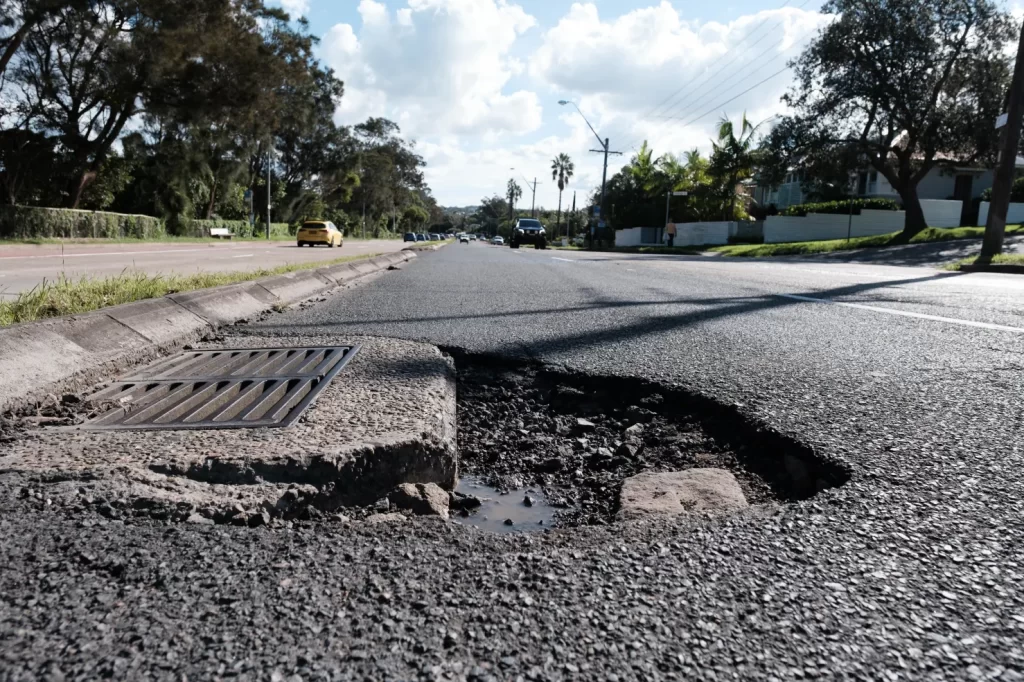A council whose “out of control” spending includes $1 million a kilometre on footpaths was among those that appeared at a parliamentary inquiry on Monday asking for more power to increase rates.
Northern Beaches Council says current funding arrangements, which limit rate increases to a level set by an independent tribunal, have left it $18 million worse off over the past three years than if rates had kept pace with inflation.

The cost of fixing local roads and footpaths has ballooned, leaving councils crying poor over rates and infrastructure contributions.CREDIT:OSCAR COLMAN
Executive manager of financial planning Caroline Foley said the council supported the “rate peg”, which caps rate rises, but the inflexible system by which councils could apply for increases above the peg was “missing the mark”.
The process was resource intensive, costly and could be “politically contentious”, she said. Rather, councils should be given the power to lift rates by small amounts above the peg to cover costs.
The council appeared with two others, Parramatta and Blacktown, at a Labor-chaired inquiry into local government infrastructure funding amid widespread concern about the financial viability of NSW councils and their revenue streams.
Northern Beaches councillors nearly rejected the council’s draft 2024-25 budget in April, when several raised concerns about spending and plans to borrow $4.6 million from restricted cash reserves intended for Mona Vale cemetery.
Under questioning by independent councillor Vincent de Luca, staff confirmed footpaths in the municipality were estimated to cost just over $1 million per kilometre.
“It is absolutely ridiculous that $1 million per kilometre is envisaged for a footpath. That is not acceptable,” de Luca said. “We cannot keep hitting the ratepayers with increases.”
Costs to fix local roads ballooned to $7.1 million for 4.8 kilometres. Liberal councillor David Walton said the council’s operational expenditure was “out of control” and that savings made so far had amounted to no more than a rounding error.
Northern Beaches councillors narrowly agreed to place the draft budget on exhibition after mayor Sue Heins used her casting vote.
“Council is not immune to growing pressure on our financial sustainability and the rising costs of materials, contracts and construction,” she said. “We continue to work hard to find ways to offset cost pressures while maintaining our services and assets.”
At Monday’s inquiry, Blacktown City Council, the largest in NSW, and one of the fastest-growing, said the infrastructure contributions model was broken and had led to a $630 million shortfall for community facilities associated with the municipality’s growth. The council is opposed to the rate peg.
Long-serving chief executive Kerry Robinson said new residents would have “no libraries, no aquatic facilities and no community meeting places” because levies on developers were insufficient to cover the costs. Increasing those charges would not increase the price of housing, he said.
“It will force developers to pay less for the land that they consume as part of the in-globo land development process,” Robinson said. “There is absolutely no reason why developers ought not be levied for those facilities.”
However, he acknowledged previous attempts at value capture – or taxing the windfall profits of those who benefit from land rezoning – had failed due to the opposition of wealthy landowners.
“The political reality is that the community accepts that it’s better to bash up the development industry and doesn’t really care if contributions are sought from developers,” Robinson said.
Blacktown contemplated a special rate increase of 20 per cent over two years in 2022, but ditched it after a community backlash, or what Robinson described on Monday as “political pressure”.
Last year, the Independent Pricing and Regulatory Tribunal approved special rate increases for 17 NSW councils, including a 93 per cent boost over four years for Strathfield Council, which is one of Sydney’s smallest.
Local Government Minister Ron Hoenig said the inquiry into councils’ financial sustainability was warranted during a cost of living crisis that was challenging local governments and ratepayers.
“It’s clear we need to improve the financial health, transparency and accountability of local government in this state, and we will consider the findings of the inquiry before making any policy decisions,” he said.
This article appeared in the Sydney Morning Herald on 4 June 2024.
By Michael Koziol who is Sydney Editor of The Sydney Morning Herald, based in our Sydney newsroom. He was previously deputy editor of The Sun-Herald and a federal political reporter in Canberra.
